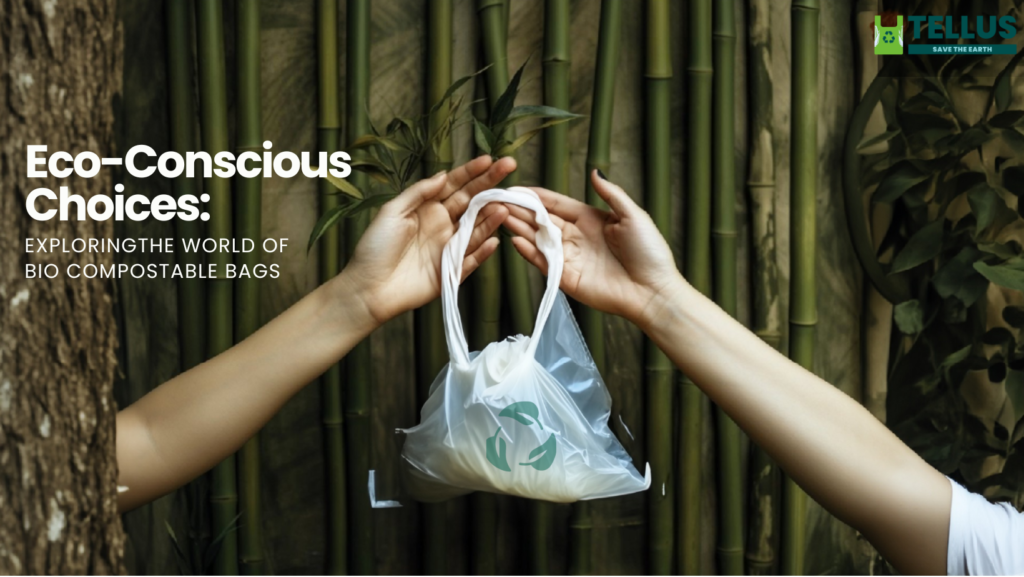
In recent years, the shift towards sustainability has brought bio compostable bags to the forefront of eco-conscious choices. These bags, designed to leave minimal environmental footprint, are becoming an essential part of our journey towards a greener future. But what exactly are bio compostable bags, and how do they differ from their counterparts? Let’s delve into this green innovation.
What is a Bio-compostable Bag?
Bio compostable bags are made from materials that allow them to break down and decompose in a compost environment. Unlike traditional plastic bags that linger in landfills for centuries, these bags can disintegrate into natural elements within a specified period under composting conditions, without leaving harmful residues behind.

Is Bio Bags by TellUs Really Compostable?
Yes, these bags are completely compostable. They are specifically designed to decompose in a compost setting, turning into carbon dioxide, water, and biomass within a few days. This rapid decomposition is a stark contrast to conventional plastic bags, making Bio Bags by TellUs an environmentally friendly option for waste disposal.
Biodegradable vs. Compostable Plastic
The terms ‘biodegradable’ and ‘compostable’ are often used interchangeably, but there’s key difference. Biodegradable plastics are designed to break down with the help of microorganisms over time but might leave behind metal residues. Compostable Bio Bags by TellUs, not only break down fully but do so in a way that contributes positively to the soil, without leaving any toxic materials.

Advantages of Compostable Bags :-
Compostable bags offer a greener alternative that benefits both the environment and potentially the bottom line of businesses.
Contribution to a Greener Environment:
Compostable bags at TellUs are made from plant-based materials like corn starch, which allow them to break down into natural substances such as soil or compost under the right conditions. This process can significantly reduce the amount of waste sent to landfills and contribute to the cycle of sustainability by returning nutrients to the earth.
Cost-Effectiveness:
While the perception may be that compostable bags are more expensive than plastic, but in reality, it is cheaper. TellUs ensures that we provide compostable bags at a price that is much cheaper than its other non-friendly alternatives available in the market. Reducing dependency on petroleum- based products can lower the carbon footprint and potentially reduce costs associated with waste management and disposal. Moreover, businesses that adopt compostable bags may enhance their brand image, attracting consumers who prefer to shop from environmentally responsible companies.
Less Carbon Footprint:
Compostable bags have a lower carbon footprint during their production compared to conventional plastic bags. By opting for materials derived from renewable sources, these bags not only reduce the use of fossil fuels but also the greenhouse gas emissions associated with their production.
Easy to Recycle and Suitable for Plant Life:
Unlike plastic bags, which can be difficult to recycle and harmful to plant life when not disposed of properly, compostable bags offer an eco-friendly alternative. These bags break down in a manner that does not degrade soil quality, making them a suitable option for composting along with organic waste.
Quality and Utility:
Despite being made from natural materials, compostable bags do not compromise on quality or utility. They are as durable and versatile as traditional plastic bags, suitable for a variety of uses from grocery shopping to waste disposal, without the environmental guilt.
Regulatory Compliance:
With increasing regulations aimed at reducing plastic consumption and promoting sustainable alternatives, adopting compostable bags can help businesses stay compliant and ahead of legislative changes. This proactive approach not only benefits the environment but also positions companies as leaders in sustainability.
Conclusion :
Bio compostable bags represent a significant step forward in our collective effort to reduce plastic pollution and promote a sustainable lifestyle. While they come with their own set of challenges, including disposal and cost considerations, their benefits to the environment are undeniable. As awareness grows and technology advances, it’s likely that these bags will become an even more
integral part of our daily lives, helping us to make eco-conscious choices with ease and confidence.
Do you think the convenience of compostable bags outweighs their current disadvantages?
